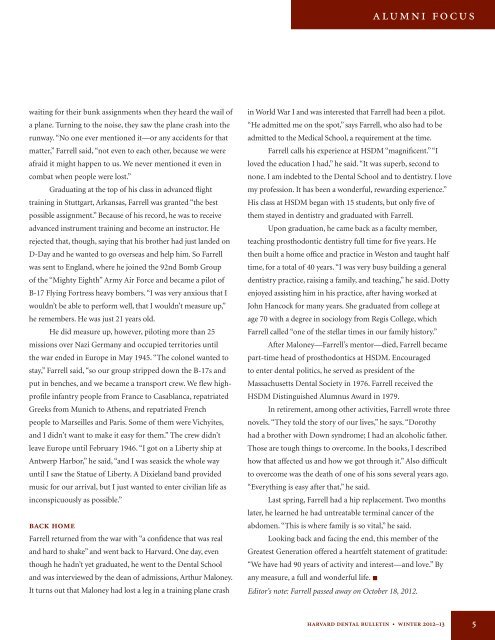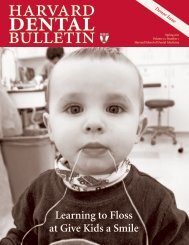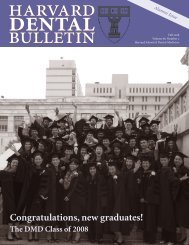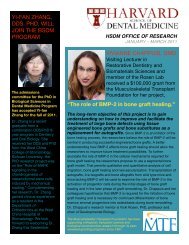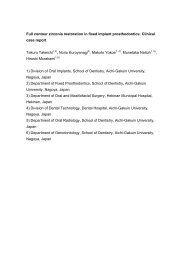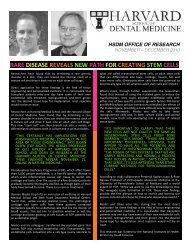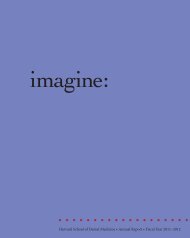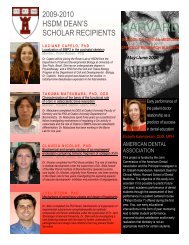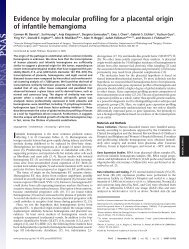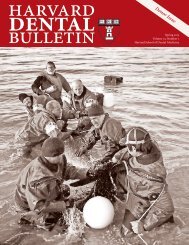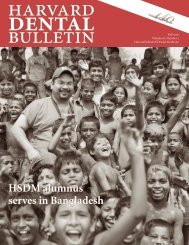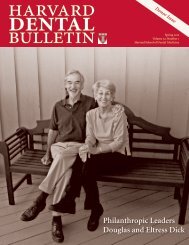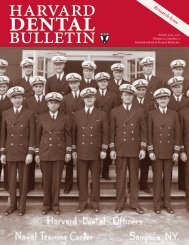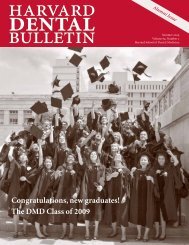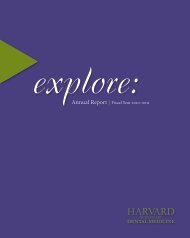Public Health Issue - Harvard School of Dental Medicine
Public Health Issue - Harvard School of Dental Medicine
Public Health Issue - Harvard School of Dental Medicine
- No tags were found...
Create successful ePaper yourself
Turn your PDF publications into a flip-book with our unique Google optimized e-Paper software.
alumni focuswaiting for their bunk assignments when they heard the wail <strong>of</strong>a plane. Turning to the noise, they saw the plane crash into therunway. “No one ever mentioned it—or any accidents for thatmatter,” Farrell said, “not even to each other, because we wereafraid it might happen to us. We never mentioned it even incombat when people were lost.”Graduating at the top <strong>of</strong> his class in advanced flighttraining in Stuttgart, Arkansas, Farrell was granted “the bestpossible assignment.” Because <strong>of</strong> his record, he was to receiveadvanced instrument training and become an instructor. Herejected that, though, saying that his brother had just landed onD-Day and he wanted to go overseas and help him. So Farrellwas sent to England, where he joined the 92nd Bomb Group<strong>of</strong> the “Mighty Eighth” Army Air Force and became a pilot <strong>of</strong>B-17 Flying Fortress heavy bombers. “I was very anxious that Iwouldn’t be able to perform well, that I wouldn’t measure up,”he remembers. He was just 21 years old.He did measure up, however, piloting more than 25missions over Nazi Germany and occupied territories untilthe war ended in Europe in May 1945. “The colonel wanted tostay,” Farrell said, “so our group stripped down the B-17s andput in benches, and we became a transport crew. We flew highpr<strong>of</strong>ileinfantry people from France to Casablanca, repatriatedGreeks from Munich to Athens, and repatriated Frenchpeople to Marseilles and Paris. Some <strong>of</strong> them were Vichyites,and I didn’t want to make it easy for them.” The crew didn’tleave Europe until February 1946. “I got on a Liberty ship atAntwerp Harbor,” he said, “and I was seasick the whole wayuntil I saw the Statue <strong>of</strong> Liberty. A Dixieland band providedmusic for our arrival, but I just wanted to enter civilian life asinconspicuously as possible.”back homeFarrell returned from the war with “a confidence that was realand hard to shake” and went back to <strong>Harvard</strong>. One day, eventhough he hadn’t yet graduated, he went to the <strong>Dental</strong> <strong>School</strong>and was interviewed by the dean <strong>of</strong> admissions, Arthur Maloney.It turns out that Maloney had lost a leg in a training plane crashin World War I and was interested that Farrell had been a pilot.“He admitted me on the spot,” says Farrell, who also had to beadmitted to the Medical <strong>School</strong>, a requirement at the time.Farrell calls his experience at HSDM “magnificent.” “Iloved the education I had,” he said. “It was superb, second tonone. I am indebted to the <strong>Dental</strong> <strong>School</strong> and to dentistry. I lovemy pr<strong>of</strong>ession. It has been a wonderful, rewarding experience.”His class at HSDM began with 15 students, but only five <strong>of</strong>them stayed in dentistry and graduated with Farrell.Upon graduation, he came back as a faculty member,teaching prosthodontic dentistry full time for five years. Hethen built a home <strong>of</strong>fice and practice in Weston and taught halftime, for a total <strong>of</strong> 40 years. “I was very busy building a generaldentistry practice, raising a family, and teaching,” he said. Dottyenjoyed assisting him in his practice, after having worked atJohn Hancock for many years. She graduated from college atage 70 with a degree in sociology from Regis College, whichFarrell called “one <strong>of</strong> the stellar times in our family history.”After Maloney—Farrell’s mentor—died, Farrell becamepart-time head <strong>of</strong> prosthodontics at HSDM. Encouragedto enter dental politics, he served as president <strong>of</strong> theMassachusetts <strong>Dental</strong> Society in 1976. Farrell received theHSDM Distinguished Alumnus Award in 1979.In retirement, among other activities, Farrell wrote threenovels. “They told the story <strong>of</strong> our lives,” he says. “Dorothyhad a brother with Down syndrome; I had an alcoholic father.Those are tough things to overcome. In the books, I describedhow that affected us and how we got through it.” Also difficultto overcome was the death <strong>of</strong> one <strong>of</strong> his sons several years ago.“Everything is easy after that,” he said.Last spring, Farrell had a hip replacement. Two monthslater, he learned he had untreatable terminal cancer <strong>of</strong> theabdomen. “This is where family is so vital,” he said.Looking back and facing the end, this member <strong>of</strong> theGreatest Generation <strong>of</strong>fered a heartfelt statement <strong>of</strong> gratitude:“We have had 90 years <strong>of</strong> activity and interest—and love.” Byany measure, a full and wonderful life. •Editor’s note: Farrell passed away on October 18, 2012.harvard dental bulletin • winter 2012–135


